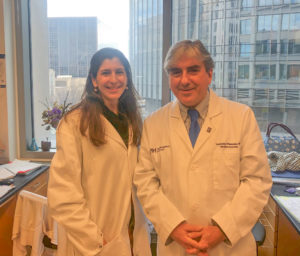
Northwestern Medicine investigators have discovered a novel signaling pathway activated by interferons, a group of immune system proteins, that suppresses the anti-tumor response of interferons in patients with a particular type of blood cancer, according to findings published in Nature Communications.
Targeting this pathway in combination with interferon therapy may provide a novel approach to improving therapy response and overall patient outcomes.
“Things are not simple with the way the immune system operates. There are different breaks and balances that control the immune response. Here, we defined a unique signaling circuit and identified cellular events that happen when interferon binds to its receptor and starts modifying cellular responses,” said Leonidas Platanias, MD, PhD, the Jesse, Sara, Andrew, Abigail, Benjamin and Elizabeth Lurie Professor of Oncology, director of the Robert H. Lurie Comprehensive Cancer Center of Northwestern University and senior author of the study.
Interferons are a group of immune system signaling proteins and are part of the body’s first line of defense against disease. When released by host cells, interferons trigger immune cells to fight off viruses and cancer by inhibiting tumor growth, survival, migration and other pro-tumorigenic properties.
Interferon therapy, namely interferon-alpha, has previously been proven to be effective in treating myeloproliferative neoplasms, a type of blood cancer in which patients have mutations in their bone marrow’s stem cells. The disease can cause an increased risk of bleeding, thrombosis, bone marrow fibrosis and oftentimes progresses to acute myeloid leukemia.
However, the mechanisms by which interferons can treat myeloproliferative neoplasms has remained unknown, as well as why some patients respond well to interferon-alpha therapy and others do not.
In the current study, Platanias’ team analyzed blood and bone marrow samples from patients diagnosed with two types of myeloproliferative neoplasms — polycythemia vera and essential thrombocythemia — collected before and 12 months after patients received interferon-alpha therapy.
By studying these samples, the investigators identified the phosphorylation of the protein ULK1, which is traditionally involved in autophagy, or when the body cleans out damaged cells in order to regenerate new ones. The investigators discovered this novel ULK1 pathway is essential for interferon anti-tumor response and that increased levels of ULK1 were directly correlated with improved interferon anti-tumor activity.
“In our study, we have identified for the first time that interferon treatment induces phosphorylation of ULK1 protein in two novel sites, which are required for expression of important anti-tumor interferon responsive genes,” said Diana Saleiro, PhD, research assistant professor of Medicine in the Division of Hematology and Oncology and lead author of the study.
The investigators also documented in in vivo and in vitro models of myeloproliferative neoplasms which suggest when this pathway is engaged, two proteins that closely interact with ULK1 — ROCK1 and ROCK2 — are activated and trigger a negative feedback loop suppressing the interferon anti-tumor response.
Increased expression of ROCK1 and ROCK2 is commonly observed in patients with myeloproliferative neoplasms, so inhibiting these proteins in combination with interferon-alpha may improve treatment response for these patients, according to the authors.
“We show that if we target these proteins with a drug, we can enhance the ability of interferons to kill malignant cells,” Platanias said, adding that the current findings could also apply to other types of cancers that may respond to interferon activity.
“There are a group of other cancers in which interferon treatment has clinical activity, and we speculate that there could be a similar situation in those cells, as well,” Platanias said.
Co-authors include Frank Dieter Eckerdt, PhD, research assistant professor of Medicine in the Division of Hematology and Oncology; Elspeth Morrison Beauchamp, PhD, research assistant professor of Medicine in the Division of Hematology and Oncology; Mariafausta Fischietti, PhD, research assistant professor of Medicine in the Division of Hematology and Oncology; and Masha Kocherginsky, PhD, professor of Preventive Medicine in the Division of Biostatistics and of Obstetrics and Gynecology in the Division of Gynecologic Oncology.
Saleiro, Eckerdt, Beauchamp, Fischietti and Kocherginsky are members of the Lurie Cancer Center.






